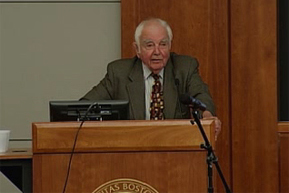Breaking the Health-Care Reform Gridlock: What the Next President Needs to Know
BUniverse: the 2008 William J. Bicknell Lectureship

Click here to watch Rashi Fein on BUniverse.
Medical economist Rashi Fein advocatesoverhauling a broken health-care system amid the nation’s crumblingfinancial market, but acknowledges that such a change may not be a toppriority of the next president. Fein is the keynotespeaker at the 2008 William J. Bicknell Lectureship at the BU School of Public Health.
“There will be a temptation, if not a pressure, to place health care ata low priority,” says Fein, a professor emeritus of medical economics at Harvard Medical School,in laying out the challenges facing the next administration. “I fearthe next months, the next years, will be very difficult ones for thisnation. . . . It doesn’t mean curl up and die, but it means the battlebecomes much more difficult.”
Fein, an advocate for a reform plan that would provide universal healthinsurance through a single-payer, Medicare-like system, says he isskeptical that such a program is “in the cards, at this time,” giventhe economic turmoil. Health-care reform advocates may have to takesmaller steps to achieve their goal, he says, suggesting that a firststep might be a Medicare-style program that covers all children andlater could be expanded to adults.
His talk was followed by a panel discussion featuring Dolores Mitchell,executive director of the Group Insurance Commission, aquasi-independent Massachusetts agency established to provide state andcertain municipal employees, retirees, and their dependents with accessto health benefits, and Alice Coombs, a physician at South Shore Hospital and chair of the Workforce Diversity Committee for the American Medical Association Commission to End Health Care Disparities and the Massachusetts Sub-Committee of the States Commission to Eliminate Health Care Disparities.
About the speaker:
Rashi Feinis a professor emeritus of medical economics at Harvard Medical School.Before joining Harvard, he was a senior fellow in the economics studyprogram at the Brookings Institution in Washington, D.C., from 1963 to1968, a member of the senior staff of President Kennedy’s Council ofEconomic Advisors, and an associate professor of economics at theUniversity of North Carolina, Chapel Hill. He served on the staff ofPresident Truman’s Commission on the Health Needs of the Nation in 1952. He is the author of numerous books and articles in the health field, including The Health Care Mess: How We Got Into It and What It Will Take to Get Out (Harvard University Press, 2005), which he cowrote with Julius B. Richmond.
Comments & Discussion
Boston University moderates comments to facilitate an informed, substantive, civil conversation. Abusive, profane, self-promotional, misleading, incoherent or off-topic comments will be rejected. Moderators are staffed during regular business hours (EST) and can only accept comments written in English. Statistics or facts must include a citation or a link to the citation.